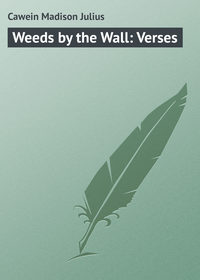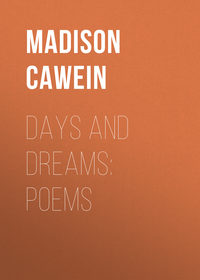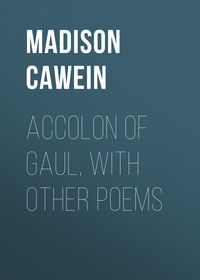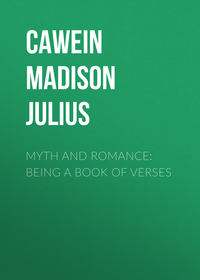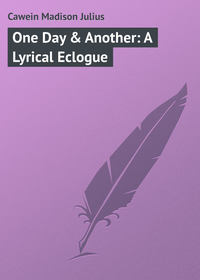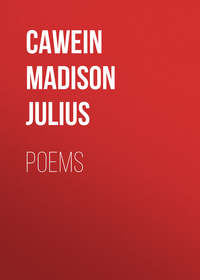The Poems of Madison Cawein. Volume 2 (of 5)
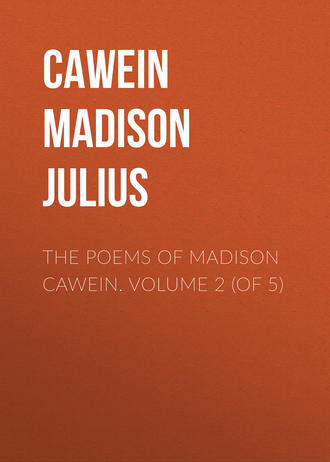 полная версия
полная версияThe Poems of Madison Cawein. Volume 2 (of 5)
Жанр: зарубежная поэзиязарубежная классиказарубежная старинная литературастихи и поэзиясерьезное чтениеcтихи, поэзия
Язык: Английский
Год издания: 2018
Добавлена:
Настройки чтения
Размер шрифта
Высота строк
Поля
MASKS
Cucullus non facit monachumLive it down! as you have spokenYou could live it ere you knewWhat love was—“a bauble broken,Foolish, of a thing untrue.”—You, Viola, with your beauty,Cloistered, die a nun? No! you—You must wed: it is your duty.There’s your poniard; for the secondIn this tazza dropped: the bloodOn it scarcely hard.... I reckonedHappily that hour we stoodThere upon your palace-stairway,How, with the Franciscan hoodCowled, I said, there was a bare way.In the minster there I found it—Our revenge. I saw him, wild,Stalking towards the church: around itDogged him, marking how he smiledIn the moonlight where I waited.When the great clock, beating, dialedTen, I knew he would be mated.Heaven or my better devil!—Hardly had his sword and plumeVanished in the dark, when, levelOn the long lagoon, did loom,Under moonlight-woven arches,Her slim gondola: all gloom:One tall gondolier: no torches.Dusky gondolas kept bringingRevellers: and far the nightRang with instruments and singing.—From the imbricated lightOf the oar-vibrating water,Gliding up the stairway, white,Velvet-masked,—the count’s own daughter!Quick I met her: whispered, “Flora,Gaston.—Mia, till they go,One brief moment here, Siora.—She’ll perceive us—she, below,See! the duchess’ diamonds sparklingRound the inviolable glowOf her throat—there, dimly darkling:“That’s Viola!” … Thus I drew herIn the church’s ancient pile—Under her black mask I knew her,By her chin, her lips, her smile.Through one marble-foliatedWindow fell the moon-rays. WhileAll the maskers passed we waited.I had drawn the dagger. TurningCalled her by her name. Some lieOf a passion sighed, her burningHand in mine; when, stalking by,In the square, his form bejeweledGleamed. My very blood burned dryWith the hate his presence fueled.Our revenge! up-pushing slightlyCowl, the mask fell, and revealedBalka, as the poniard whitelyFlashed. The hollow nave re-pealedOne long shriek the loft repeated.Swift, I stabbed her thrice. She reeledDead. I thought of you, the heatedHorror on my hands; and tarriedStill as silence. Drawn asideOn her face the mask hung, marriedTo its camphor-pallor: wideEyes with terror—stone. One secondI regretted; then defiedAll remorse. Your promise beckoned;And I left her. Love had pointedMe this way. I walked the wayClear-eyed and … it has anointedUs fast lovers?—Do not say,Now, that you will go and nun it!For this man who scorned you?—Nay!—Live to hate him! You ’ve begun it.CARMEN
La Gitanilla, tall dragoonsIn Andalusian afternoons,With ogling eye and compliment,Smiled on you as along you wentSome sleepy street of old Seville;Twirled with a military skillMoustaches; buttoned uniformsOf Spanish yellow bowed your charms.Proud, wicked head, and hair blue-black,Whence the mantilla, half thrown back,Discovered shoulders and bold breastBohemian brown. And you were dressedIn some short skirt of gypsy redOf smuggled stuff; and stockings,—deadWhite silk,—that, worn with many a hole,Let the plump leg peep through; while stole,Now in, now out, your dainty toes,Sheathed in morocco shoes, with bowsOf scarlet ribbon.—FlirtinglyYou walked by me; and I did seeYour oblique eyes, your sensuous lipThat gnawed the rose I saw you flipAt bashful José’s nose while loudThe gaunt guards laughed among the crowd.And in your brazen chemise thrust,Heaved with the swelling of your bust,A bunch of white acacia bloomsWhiffed past my nostrils hot perfumes.As in a cool neveriaI ate an ice with Mérimée,Dark Carmencita, very gayYou passed, with light and lissome tread,All holiday bedizenéd;A new mantilla on your head:Your crimson dress gleamed, spangled fierce;And crescent gold, hung in your ears,Shone, wrought Morisco; and each shoe,Of Cordovan leather, buckled blue,Glanced merriment; and from large armsTo well-turned ankles all your charmsBlew flutterings and glitteringsOf satin bands and beaded strings:Around each tight arm, twisted goldCoiled serpents, and, a single fold,Wreathed wrists; each serpent’s jeweled head,With rubies set, convulsive red.In flowers and trimmings, to the jarOf mandolin and gay guitar,You in the grated patioDanced: the curled coxcombs’ staring rowRang pleased applause. I saw you dance,With wily motion and glad glance,Voluptuous, the wild romalis,Where every movement was a kiss,A song, a poem, interwoundWith your Basque tambourine’s dull sound.I,—as the ebon castanetsClucked out dry time in unctuous jets,—Saw angry José through the grateGlare on us, a pale face of hate,When some indecent officerPresumed too lewdly to you there.Some still night in Seville: the streetCandilejo: two shadows meet:Swift sabres flash within the moon—Clash rapidly.—A dead dragoon.AT NINEVEH
There was a princess once, who loved the slaveOf an Assyrian king, her father; knownAt Nineveh as Hadria; o’er whose graveThe sands of centuries have long been blown;Yet sooner shall the night forget its starsThan love her story:—How, unto his throne,One day she came, where, with his warriors,The King sat in his hall of audience,’Mid pillared trophies of barbaric wars,And, kneeling to him, asked, “O father, whenceComes love and why?”—He, smiling on her said,—“O Hadria, love is of the gods, and henceDivine, is only soul-interpreted.But why love is, ah, child, we do not know,Unless ’t is love that gives us life when dead.”—And then his daughter, with a face aglowWith all the love that clamored in her bloodIts sweet avowal, lifted arms of snow,And, like Aurora’s rose, before him stood,Saying,—“Since love is of the powers above,I love a slave, O Asshur!—Let the goodThe gods have giv’n be sanctioned.—Speak not ofDishonor and our line’s ancestral dead!They are imperial dust. I live and love.”—Black as black storm then rose the King and said,—A lightning gesture sweeping at her there,—“Enough! ho, Rhana, strike me off her head!”And at the mandate, with his limbs half bareA slave strode forth. Majestic was his formAs some young god’s. He, gathering up her hair,Wound it three times around his sinewy arm;Then drew his sword. It for one moment shoneA semicircling light, and, dripping warm,Lifting the head he stood before the throne.Then said the despot, “By the horn of Bel!This was no child of mine!”—Like chiseled stoneStern stood the slave, a son of Israel.Then striding towards the monarch, in his eyeThe wrath of heaven and the hate of hell,Shrieked, “Beast! I loved her! look on us and die!”Swifter than fire clove him to the brain.Then kissed her face, and, holding it on high,Cried out, “Judge thou, O God, between us twain!”And, fifty daggers in his heart, fell slain.SENORITA
An agate black, her roguish eyesClaim no proud lineage of the skies,No starry blue; but of good earthThe reckless witchery and mirth.Looped in her raven hair’s repose,A hot aroma, one red roseDroops; envious of that loveliness,Through being near which, its is less.Twin sea-shells hung with pearls, her ears;Whose delicate rosiness appearsPart of the pearls; whose pallid fireBinds the attention these inspire.One slim hand crumples up the laceAbout her bosom’s swelling grace;A ruby at her samite throatLends the required color-note.The moon brings up the violet nightAn urn of pearly-chaliced light;And from the dark-railed balconyShe stoops and waves her fan at me.O’er orange blossoms and the roseVague, odorous lips the South Wind blows,Peopling the night with whispers ofRomance and palely passionate love.And now she speaks; and seems to reachMy soul like song that learned its speechFrom some dim instrument—who knows?—Or flow’r, a dulcimer or rose.SINCE THEN
I found myself among the treesWhat time the reapers ceased to reap;And in the sunflower-blooms the beesHuddled brown heads and went to sleep,Rocked by the balsam-breathing breeze.I saw the red fox leave his lair,A shaggy shadow, on the knoll;And, tunnelling his thoroughfareBeneath the soil, I watched the mole—Stealth’s own self could not take more care.I heard the death-moth tick and stir,Slow-honeycombing through the bark;I heard the cricket’s drowsy chirr,And one lone beetle burr the dark—The sleeping woodland seemed to purr.And then the moon rose: and a whiteLow bough of blossoms—grown almostWhere, ere you died, ’t was our delightTo tryst,—dear heart!—I thought your ghost:—The wood is haunted since that night.AFTER DEATH
At moonset, when ghost speaks with ghostAnd spirits meet where once they sinned,Between the whispering wood and coast,My soul met her soul on the wind,My late-lost Evalind.I kissed her mouth. Her face was wild.Two burning shadows were her eyes,Wherein the love,—that once had smiledA heartbreak smile,—in some strange wise,I did not recognize.Then suddenly I seemed to seeHow sin had damned my soul and doomedTo wander thus eternallyWith love and loathing, that assumedThe form of her entombed.THE OLD MAN DREAMS
The blackened walnut in its spicy hullRots where it fell;And, in the orchard, where the trees stand full,The pear’s brown bellDrops; and the log-house in the bramble lane,From whose low doorStretch yellowing acres of the corn and cane,He sees once more.The cat-bird sings upon its porch of pine;And o’er its gate,All slender-podded, twists the trumpet-vineIts leafy weight:And in the woodland, by the spring, mayhap,With eyes of joyAgain he bends to set a rabbit-trap,A brown-faced boy.Then, whistling, through the underwoods he goes,Out of the wood,Where, with young cheeks, red as an autumn rose,In gingham hood,His sweetheart waits, her school-books on her arm:And now it seemsBeside his chair bends down his wife’s fair form—The old man dreams.MEMORIES
Here where Love lies perishéd,Look not in upon the dead,Lest the shadowy curtains, shakenIn my Heart’s dark chamber, wakenGhosts, beneath whose garb of sorrowWhilom gladness bows his head:When you come at morn, to-morrow,Look not in upon the dead,Here where Love lies perishéd.Here where Love lies cold interred,Let no syllable be heard,Lest the hollow echoes, housingIn my Soul’s deep tomb, arousingWake a voice of woe, once laughterClaimed and clothed in joy’s own word:When you come at dusk, or after,Let no syllable be heard,Here where Love lies cold interred.MARCH AND MAY
Windy the sky and mad;Surly the gray March day;Bleak the forests and sad,—Oh, that it only were May!On maples, tasseled with red,No blithe bird, fluting, swung;The brook, in its swollen bed,Raved on in an unknown tongue.We walked in the wind-tossed wood:Her face as the May’s was fair;Her blood was the May’s own blood;And May’s her radiant hair.And we found in the woodland wildOne cowering violet,Like a frail and timorous child,In the caked leaves bowed and wet.And I said, “We have walked in vain!To find but this shivering bud,Weighed down with its weight of rain,Crouched here in the wild March wood.”But she said, “Though the day be sad,And the skies be dark with fate,There is always something gladThat will help our hearts to wait.“Look, now, at this beautiful thing,In this wood’s wild hollow curled!’Tis a promise of joy and spring,And of love, to the waiting world.“Ah, the sinless Earth is fair,And man’s are the sin and the gloom—Come, bury the days that were,And look to’ard the days to come!”* * *And the May came on with her charms,With twinkle and rustle of feet;Blooms stormed from her luminous armsAnd songs that were wildly sweet.Now I think of her words that day,This day that I longed so to see,That finds her dead with the May,And my life but a withered tree.IN AUTUMN
I
Sunflowers wither and lilies die,Poppies are pods of seeds;The first red leaves on the pathway lie,Like blood of a heart that bleeds.Weary alway will it be to-day,Weary and wan and wet;Dawn and noon will the clouds hang gray,And the autumn wind will sigh and say,“He comes not yet, not yet,Weary alway, alway!”II
Hollyhocks bend all tattered and torn,Marigolds all are gone;The last pale rose lies all forlorn,Like love that is trampled on.Weary, ah me! to-night will be,Weary and wild and hoar;Rain and mist will blow from the sea,And the wind will sob in the autumn tree,“He comes no more, no more.Weary, ah me! ah me!”“WHEN SHE DRAWS NEAR”
I
When she draws near,I seem to hearThe shy approach of some wild innocence:As if—in acorn crown—A dryad should step downFrom some dim oak-tree where the woods are dense.II
When she’s with me,I seem to seeThe brambles blossom where just touched her dress:As, with her love’s perfume,She touches into bloomThe thorns of life and gives them loveliness.REED CALL FOR APRIL
I
When April comes, and pelts with budsAnd apple-blooms each orchard space,And takes the dogwood-whitened woodsWith rain and sunshine of her moods,Like your fair face, like your sweet face:It’s honey for the bud and dew,And honey for the heart!And, oh, to be away with youBeyond the town and mart.II
When April comes and tints the hillsWith gold and beryl that rejoice,And from her airy apron spillsThe laughter of the winds and rills,Like your young voice, like your sweet voice:It’s gladness for God’s bending blue,And gladness for the heart!And, oh, to be away with youBeyond the town and mart.III
When April comes, and binds and girdsThe world with warmth that breathes above,And to the breeze flings all her birds,Whose songs are welcome as the wordsOf you I love, O you I love:It’s music for all things that woo,And music for the heart!And, oh, to be away with youBeyond the town and mart.HER VIOLIN
I
Her violin!—Again beginThe dream-notes of her violin;And tall and fair, with gold-brown hair,I seem to see her standing there,Soft-eyed and sweetly slender:The room again, with strain on strain,Vibrates to Love’s melodious pain,As, sloping slow, is poised her bow,While round her form the golden glowOf sunset spills its splendor.II
Her violin!—Now deep, now thin,Again I hear her violin;And, dream by dream, again I seemTo see the love-light’s tender gleamBeneath her eyes’ long lashes:While to my heart she seems a partOf her pure song’s inspired art;And, as she plays, the rosy graysOf twilight halo hair and face,While sunset burns to ashes.III
O violin!—Cease, cease withinMy soul, O haunting violin!In vain, in vain, you bring again,Back from the past, the blissful painOf all the love then spoken;When on my breast, at happy rest,A sunny while her head was pressed—Peace, peace to these wild memories!For, like my heart naught remedies,Her violin lies broken.MEETING IN SUMMER
A tranquil barOf rosy twilight under dusk’s first star.A glimmering soundOf whispering waters over grassy ground.A sun-sweet smellOf fresh-reaped hay from dewy field and dell.A lazy breezeJostling the ripeness from the apple-trees.A vibrant cry,Passing, then gone, of bullbats in the sky.And faintly nowThe katydid upon the shadowy bough.And far off thenThe little owl within the lonely glen.And soon, full soon,The silvery arrival of the moon.And, to your door,The path of roses I have trod before.And, sweetheart, you!Among the roses and the moonlit dew.HER VIVIEN EYES
Her Vivien eyes,—beware! beware!—Though they be stars, a deadly snareThey set beneath her night of hair.Regard them not! lest, drawing near—As sages once in old Chaldee—Thou shouldst become a worshiper,And they thy evil destiny.Her Vivien eyes,—away! away!—Though they be springs, remorseless theyGleam underneath her brow’s bright day.Turn, turn aside, whate’er the cost!Lest in their deeps thou lures behold,Through which thy captive soul were lost,As was young Hylas once of old.Her Vivien eyes,—take heed! take heed!—Though they be bibles, none may readTherein of God or Holy Creed.Look, look away! lest thou be cursed,—As Merlin was, romances tell,—And in their sorcerous spells immersed,Hoping for Heaven thou chance on Hell.I look into thy heart and then I knowThe wondrous poetry of the long-ago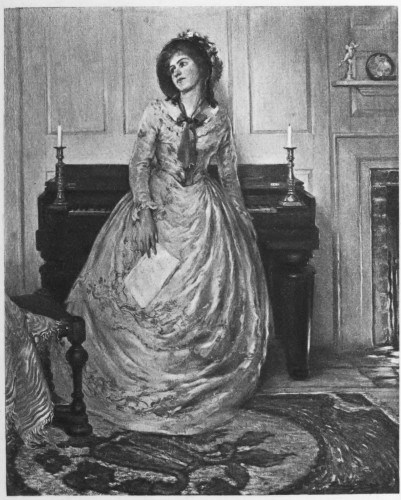
Reasons
REASONS
I
Yea, why I love thee let my heart repeat:I look upon thy face and then divineHow men could die for beauty, such as thine,—Deeming it sweetTo lay my life and manhood at thy feet,And for a word, a glance,Do deeds of old romance.II
Yea, why I love thee let my heart unfold:I look into thy heart and then I knowThe wondrous poetry of the long-ago,The Age of Gold,That speaks strange music, that is old, so old,Yet young, as when ’t was born,With all the youth of morn.III
Yea, why I love thee let my heart conclude:I look into thy soul and realizeThe undiscovered meaning of the skies,—That long have wooedThe world with far ideals that elude,—Out of whose dreams, maybe,God shapes reality.HER VESPER SONG
The summer lightning comes and goesIn one white cloud above the hill,As if within its soft reposeA burning heart were never still—As in my bosom pulses beatBefore the coming of his feet.All drugged with odorous sleep, the roseBreathes dewy balm about the place,As if the dreams the garden knowsArose, in immaterial grace—As in my heart sweet thoughts ariseBeneath the ardour of his eyes.The moon above the darkness showsAn orb of silvery snow and fire,As if the night would now discloseTo heav’n her one divine desire—As in the rapture of his kissAll my glad soul is drawn to his.The cloud divines not that it glows;The rose knows nothing of its scent;Nor knows the moon that it bestowsLight on our earth and firmament—So is the soul unconscious ofThe beauties it reveals through love.THE GLORY AND THE DREAM
There in the past I see her as of old,Blue-eyed and hazel-haired, within a roomDim with a twilight of tenebrious gold;Her white face sensuous as a delicate bloomNight opens in the tropics. Fold on foldPale laces drape her; and a frail perfume,As of a moonlit lily brimmed with rain,Breathes from her presence, drowsing heart and brain.Her head is bent; some red carnations glowDeep in her heavy hair; her large eyes gleam;—Bright sister stars of those twin worlds of snow,Her breasts, through which the veinéd violets stream.—I hold her hand; her smile comes sweetly slowAs thoughts of love that haunt a poet’s dream:And at her feet once more I sit and hearWild words of passion—dead this many a year.SNOW AND FIRE
Deep-hearted roses of the purple duskAnd lilies of the morn;And cactus, holding up a slender tuskOf fragrance on a thorn;All heavy flowers, sultry with their musk,Her presence puts to scorn.For she is like the pale, pale snowdrop there,Scentless and chaste of heart;The moonflower, making spiritual the air,Like some pure work of art;Divine and holy, exquisitely fair,And virtue’s counterpart.Yet when her eyes gaze into mine, and whenHer lips to mine are pressed,—Why are my veins all fire then? and thenWhy should her soul suggestVoluptuous perfumes, maddening unto men,And prurient with unrest?IN MAY
I
When you and I in the hills went Maying,You and I in the bright May weather,The birds, that sang on the boughs together,There in the green of the woods, kept sayingAll that my heart was saying low,“I love you! love you!” soft and low;—And did you know?When you and I in the hills went Maying.II
There where the brook on its rocks went winking,There by its banks where the May had led us,Flowers, that bloomed in the woods and meadows,Azure and gold at our feet, kept thinkingAll that my soul was thinking there,“I love you! love you!” softly there;—And did you care?There where the brook on its rocks went winking.III
Whatever befalls through fate’s compelling,Should our paths unite or our pathways sever,In the Mays to-come I shall feel foreverThe wildflowers thinking, the wild-birds telling,In words as soft as the falling dew,The love that I keep here still for you,As deep and true,Whatever befalls through fate’s compelling.“WERE I AN ARTIST”
Were I an artist, Lydia, IWould paint you as you merit,Not as my eyes, but dreams descry;Not in the flesh, but spirit.The canvas I would paint you onShould be a strip of heaven;My brush, a sunbeam; pigments, dawnAnd night and starry even.Your form and features to expressLikewise your soul’s chaste whiteness,I’d take the primal essencesOf darkness and of brightness.I’d take pure night to paint your hair;Stars for your eyes; and morningTo paint your skin—the rosy airWhich is your limbs’ adorning.To paint the love-bows of your lips,I’d mix, for colors, kisses;And for your breasts and finger-tips,Sweet odors and soft blisses.And to complete the picture well,I’d temper all with woman,—Some tears, some laughter; heaven and hell,To show you yet are human.THE RIDE
She rode o’er hill, she rode o’er plain,She rode by fields of barley,By morning-glories filled with rain,Along the wood-side gnarly.She rode o’er plain, she rode o’er hill,By orchard land and berry;Her eyes were sparkling as the rill,Cheeks, redder than the cherry.A bird sang here, a bird sang there,Then blithely sang together;Sang sudden greeting everywhere,“Good-morrow!” and “Good weather!”The sunlight’s laughing radianceLaughed in her radiant tresses;The bold breeze made her wild curls dance,And flushed her face with kisses.“Why ride you here, why ride you there,Why ride you here so merry?The sunlight living in your hair,And in your cheek the berry?“Why ride you with your sea-green plumes,Your sea-green silken habit,By balmy bosks of faint perfumes,And haunts of roe and rabbit?”“The morning ploughed the east with gold,And planted it with holly;And I was young and he was old,And rich, and melancholy.“A wife they ’d have me to his bed,And to the church they hurried;But now, gramercy! he is dead!Thank God! is dead and buried.“I ride by tree, I ride by rill,I ride by rye and clover,For by the church beyond the hillAwaits my first true lover.”AT PARTING
What is there left for us to say,Now it is time to speak good-by?And all our dreams of yesterdayAre one with yester-evening’s sky—What is there left for us to say,Now different ways before us lie?A word of hope, a word of cheer,A word of love, whose help shall last,When we are far to bring us nearThrough memories of the happy past;A word of hope, a word of cheer,To keep our young hearts true and fast.What is there left for us to do,Now it is time to say farewell?And care, that bade us once adieu,Returns again with us to dwell—What is there left for us to do,Now different ways our fates compel?Clasp hands and kiss, touch lips and smile,And look the love that shall remain—When severed so by many a mile—The sweetest balm for bitterest pain:Clasp hands and kiss, touch lips and smile,And trust to God to meet again.IN THE GARDEN OF GIRLS
Serious, but smiling, stately and serene,And lovelier than a flower,She stands; in whom all sympathies conveneAs perfumes in a bower;Through whom I feel what soul and heart must mean,And all their love and power.Eyes, that commune with the frank skies of truth,Beneath their cloud-like curls;Lips of immortal rose, where joy and youthNestle like priceless pearls;Hair, that suggests the Bible braids of Ruth,Deeper than any girl’s.When first I saw her, ’t was as if withinMy gaze took shape some song—Played by a master of the violin—A music, pure and strong,That rapt my soul above all earthly sinTo heights that know no wrong.“COME TO THE HILLS”
Come to the hills, the woods are green—The heart is high when lovers meet—There is a brook that flows betweenMossed rocks where we will make our seat,Where we will sit and speak unseen.I hear you laughing in the lane—The heart is high when lovers meet—The clover smells of sun and rainAnd spreads a carpet for our feet,Where we will walk and dream again.Come to the woods, the dusk is here—The heart is high when lovers meet—A bird upon the branches nearSets music to our hearts’ sweet beat,Our hearts that beat with something dear.I hear your step; the lane is passed—The heart is high when lovers meet—The little stars come bright and fast,Like happy eyes that watch us, Sweet,That see us greet and kiss at last.

